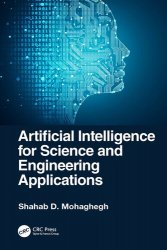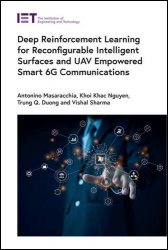 Название: Artificial Intelligence for Science and Engineering Applications
Название: Artificial Intelligence for Science and Engineering ApplicationsАвтор: Shahab D. Mohaghegh
Издательство: CRC Press
Год: 2024
Страниц: 126
Язык: английский
Формат: epub (true)
Размер: 17.3 MB
Artificial Intelligence (AI) is defined as the simulation of human intelligence through the mimicking of the human brain for analysis, modeling, and decision‑making. Science and engineering problem solving requires modeling of physical phenomena, and humans approach the solution of scientific and engineering problems differently from other problems. Artificial Intelligence for Science and Engineering Applications addresses the unique differences in how AI should be developed and used in science and engineering. Through the inclusion of definitions and detailed examples, this book describes the actual and realistic requirements as well as what characteristics must be avoided for correct and successful science and engineering applications of AI.
This book:
• Offers a brief history of AI and covers science and engineering applications
• Explores the modeling of physical phenomena using AI
• Discusses explainable AI (XAI) applications
• Covers the ethics of AI in science and engineering
• Features real‑world case studies
Machine Learning includes a series of algorithms that are used to generate Artificial Intelligence. Given the definition of Artificial Intelligence that was mentioned in the previous paragraphs, Machine Learning algorithms are used to process data and use the correct logic. The previous way of using computers (machines) to solve problems was all about explicitly programming the computer and telling it exactly what to do in complete detail. Overwhelming engineers have been using numerical simulation. Developing numerical simulations to solve engineering-related problems that have been modeled using highly complex mathematical equations requires the generation of numerical simulations. All engineers know that during the development of numerical simulation models, they must provide complete, explicit programs so that the computer can perform the numerical simulation. It is important to note that Machine Learning algorithms do not use explicit programming.
The same thing is also true of traditional statistics, which is also a data-driven technology. In traditional statistics and any other traditional type of modeling using computers (machines), we would always tell the computer what to do in exact details without asking the computer to do anything that we had not specifically told it to do.
Before Machine Learning algorithms, we would never expect the computers (machines) to do certain things that we had not told them to do (through coding). This is the main difference between Machine Learning algorithm and what has been done with computers (machines) in the past several decades. Machine Learning algorithms are Open Computer Algorithms. The main issue with Machine Learning algorithms is to let the Open Computer Algorithms learn from the data without using any pre-defined mathematical equations that are solved numerically or using a series of mathematical equations to check and see which one of the equations matches the data that is being used. Several general types of Machine Learning algorithms include Supervised Learning, Unsupervised Learning, Semi-supervised Learning, and Reinforcement Learning.
Offering a probing view into the unique nature of scientific and engineering exploration, this book will be of interest to generalists and experts looking to expand their understanding of how AI can better tackle and advance technology and developments in scientific and engineering disciplines.
Скачать Artificial Intelligence for Science and Engineering Applications
[related-news] [/related-news]
Комментарии 0
Комментариев пока нет. Стань первым!















